The drug addictions devastating Thai villages
- Published
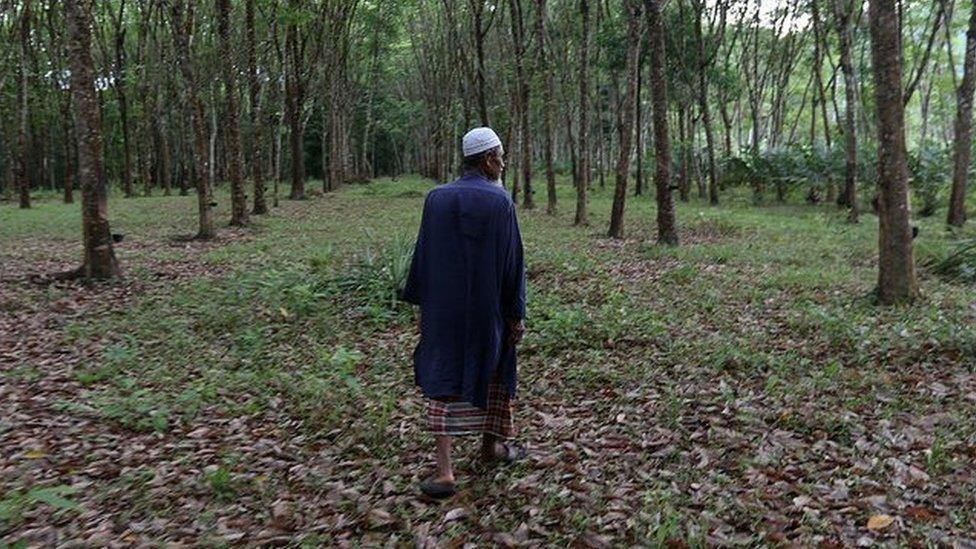
Many villagers living in Thailand's south have been affected by the drug addiction problem
Across Thailand's southern provinces, communities have been struggling with rising drug use in recent years despite crackdowns and education efforts. BBC Thai's Nanchanok Wongsamuth reports on the villages devastated by addiction.
In a small wooden hut in the middle of a rubber plantation in Narathiwat province, 28-year-old Fadel and his friends often take a drug known as kratom.
Also known as "4X100" in Thai, kratom contains four main ingredients - the leaves of a local plant known as kratom, cough syrup, Coca-Cola and ice. It is sold for around 100 Thai baht (£2.30, $2.90) per kit.
"In the past we used to boil [the leaves] ourselves, but now we buy them ready-to-drink," Fadel told BBC Thai at the hut, where Coca-Cola cans are seen scattered on the floor.
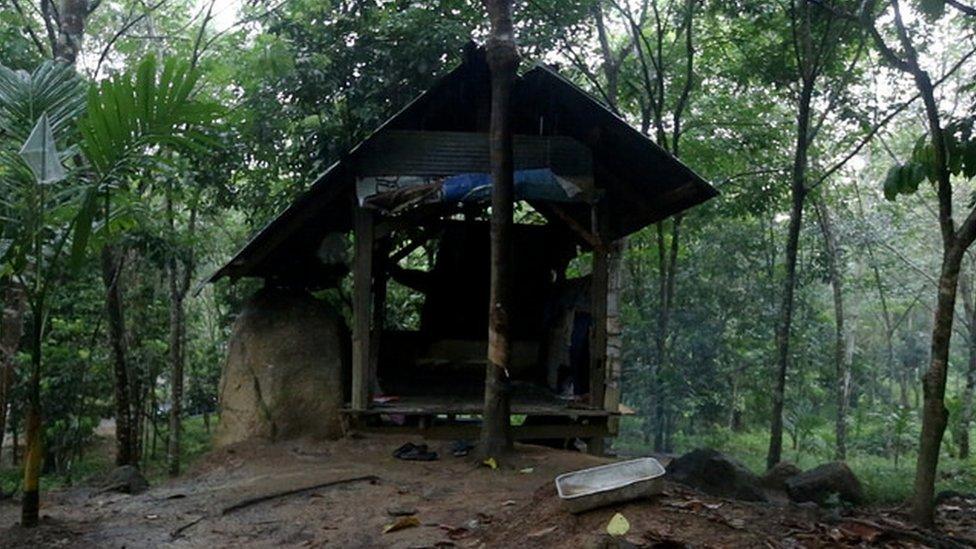
Fadel and his friends frequently take kratom in this wooden hut
Fadel has been taking drugs regularly for the past 11 years. He also uses crystal methamphetamine, and ya ba, a stimulant containing a mixture of methamphetamine and caffeine that sells for around 100 baht per pill.
He now takes one ya ba pill every two days, and drinks kratom three times a week when he is tired from work as a rubber planter. He sometimes resorts to stealing dried betel nuts to sell and fund his addiction.
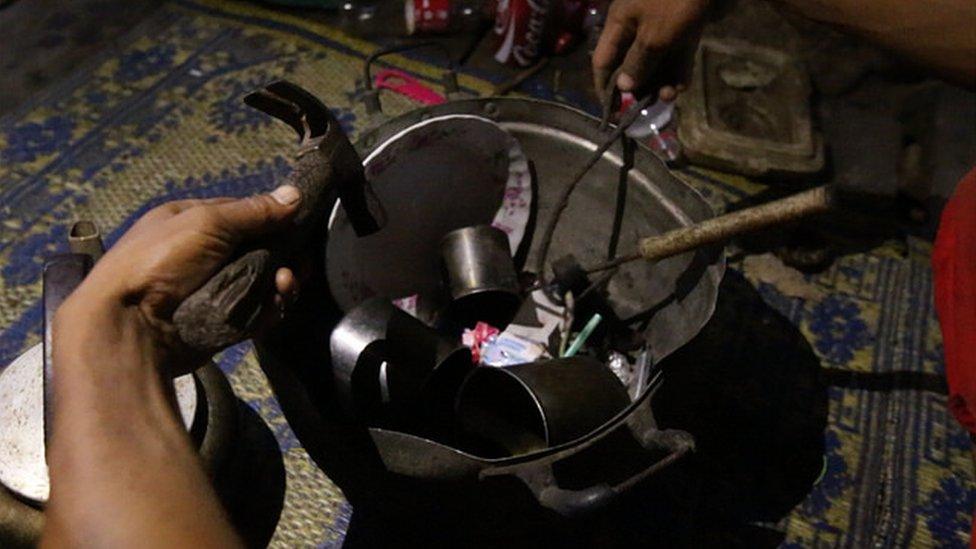
Fadel used to make kratom by himself, but these days he can buy it ready-to-drink
Fadel is one of the estimated 80,000 to 100,000 drug users in Thailand's predominantly Muslim southernmost provinces, about 5% of the population. Most of these users are aged between 14 and 30 years old.
The three provinces of Pattani, Yala and Narathiwat have the highest rates of drug addiction, according to the Thai military. An estimated one in five teenagers are addicts. Kratom is by far the most popular drug.
A recent survey found that more than 80% of people living in those provinces feel that drugs is their most pressing issue, and want the government to solve it.
Villagers have told BBC Thai that stealing is prevalent, as drug users are desperate to find a way to obtain money.
"Most people here are farmers, and things get stolen when they go to bed and no one's minding the fields," said Samart Lakatap, a probation officer in Narathiwat province.
"The problem is that the buyers are in it too - they know the sellers are drug addicts."
On the rise
The addictions have had a deep impact on communities and relationships.
Infidelity used to be the leading cause of divorce among Muslims in Thailand's southern province of Pattani. That has recently changed as a growing number of women face neglect as a result of their husbands using drugs.
"Nowadays, when a man makes a marriage proposal, the first question the father will ask her daughter is if [her boyfriend] takes any drugs," said Ahama Hayeedermee, secretary of Pattani's Islamic Council.
Last year, the council received 525 filings for divorce, of which 80% were on the grounds of drug use.
The council says it tries to mediate, but most of the complaints end in divorce, since most men do not attend the sessions.
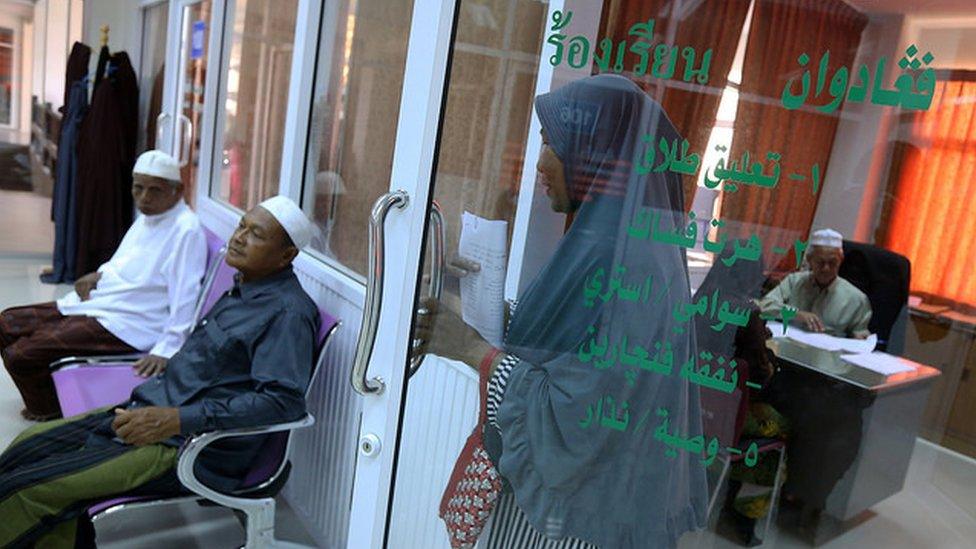
The council building has a room where local Muslims can file complaints.
In one village in Narathiwat's Marue Botok sub-district, a local man called Ismail told BBC Thai that his stepson Zabar got married last year.
Four months later Zabar's wife divorced him, after her mother found out Zabar was a drug addict.
Mr Ismail said Zabar started sniffing paint thinner at the age of nine, before getting addicted to marijuana and then ya ba. He quit school after second grade and was sent to a juvenile detention centre for two years at the age of 16.
Mr Hayeedermee said kratom addiction started becoming a problem in 2012, and he estimates that almost 90% of all villages in Pattani have drug users, mostly teenagers.
"We don't know why, but the number [of addicts] is on the rise," Mr Hayeedermee said.
"I used to ask the soldiers why there are so many drugs in Pattani and how they can escape the checkpoints. They didn't have an answer."
'Insurgents paid for by drugs'
The Thai military government has claimed that security issues in the insurgency-torn south have prevented them from solving drug-related issues in the region.
That led to a "secret" report submitted by the national security council to the cabinet in 2009, which included claims that insurgency groups used drugs to influence youth to join their groups, and also used money from the drug trade to sponsor their violent activities.
"Many times when we arrest drug kingpins, we also find war weapons," Col Suwan Chirdshai of the Internal Security Operations Command (ISOC) Region 4, which oversees military missions in the south.
"Many times we also receive information that those involved in the drug trade have wired money to local insurgency groups…and those arrested by security forces have said they were paid for by drugs."
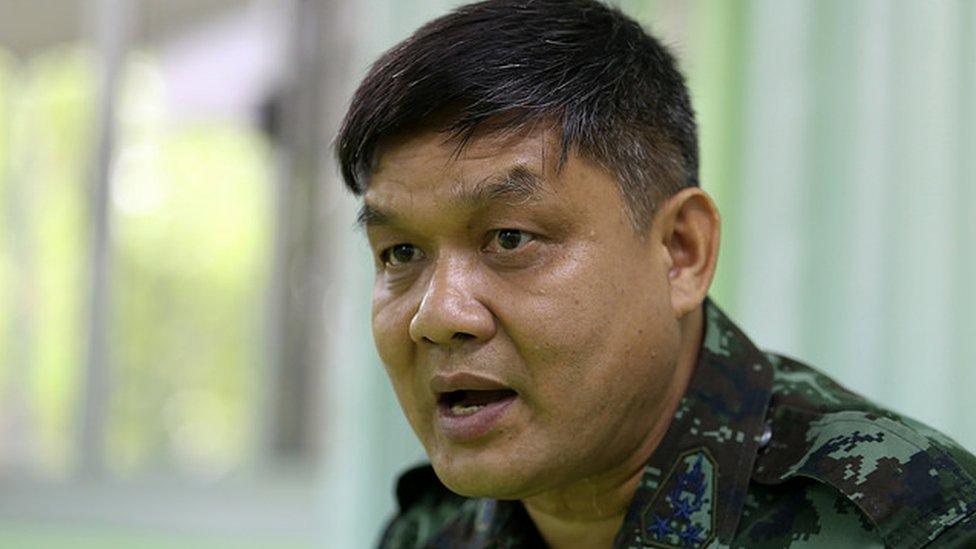
Col Suwan said the drug trade was connected to insurgent groups
But that information contrasts with that from the non-governmental organisation Aids Access Foundation.
A 2007-2011 field survey of staff found that none had been in contact with any drug users associated with insurgency groups.
"The government discourse is that those spreading drugs are insurgency groups… but they [local people] think that it's the government who is bringing in the drugs," said Phrae Sirisakdamkoeng, an assistant professor in anthropology at Silpakorn University.
"The only question they have is: how can there be drugs when there are so many checkpoints?"
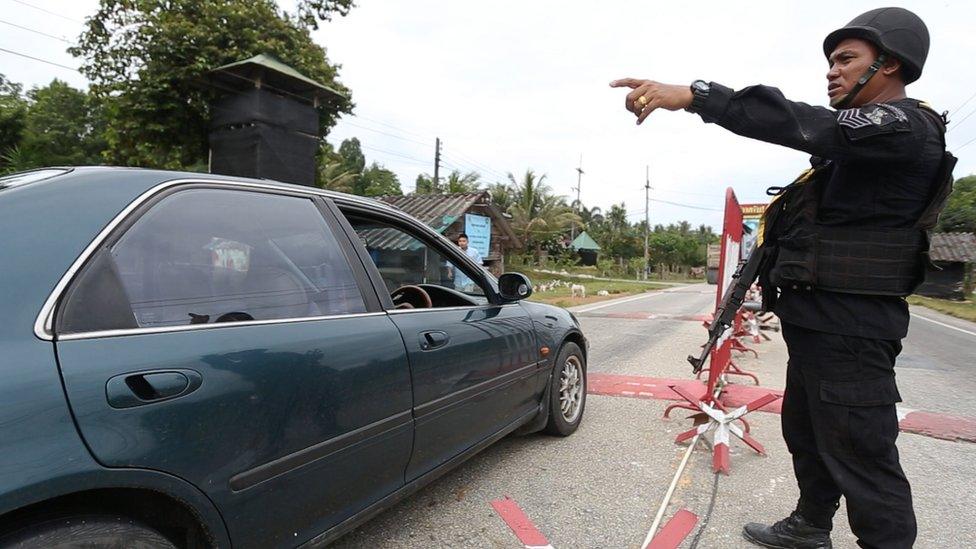
There have been questions on the prevalence of drugs given tight security
Col Suwan said although there are many checkpoints in the southern provinces, vehicles are randomly checked or inspected only when there is a tip-off.
"There needs to be a tip-off in order [for a vehicle] to be thoroughly inspected, and therefore [the drugs] are from the vehicles that were not inspected," he said.
'The new path'
The Thai military is trying other ways to tackle the problem, such as education.
At an ISOC drug prevention training centre in Pattani's Yarang district, about 145 villagers, village headmen, former drug users and traders are singing and reciting oaths.
"Do whatever you can for children to hate drugs," the centre's director, Col Suwan, told the crowd.
The group is participating in the Yalannanbaru project, which means "the new path" in Malay.
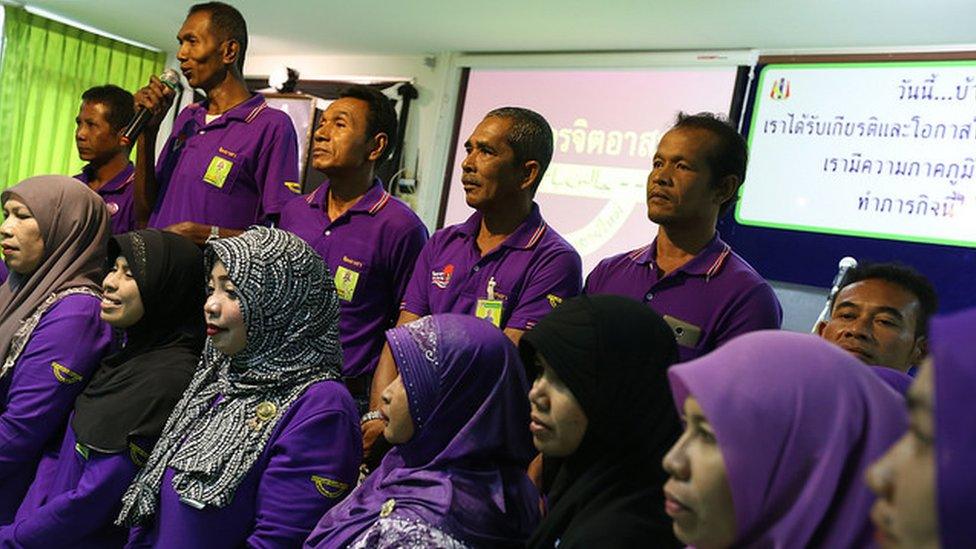
Yalannanbaru volunteers recite oaths at training sessions
Yalannanbaru initially started in 2007 as a project to educate youth with risks of developing a drug addiction. In 2015 its volunteers started to reach out to those in need in each village, without the use of law enforcement.
There are currently 2,512 volunteers in 352 villages, with the number next year expected to reach 20,750 volunteers in 2,075 villages.
"A crackdown accomplishes very little, it is impossible for them [drug users] to quit because they are already addicted. Apart from that, the government is not able to gain access to drug users," said Col Suwan.
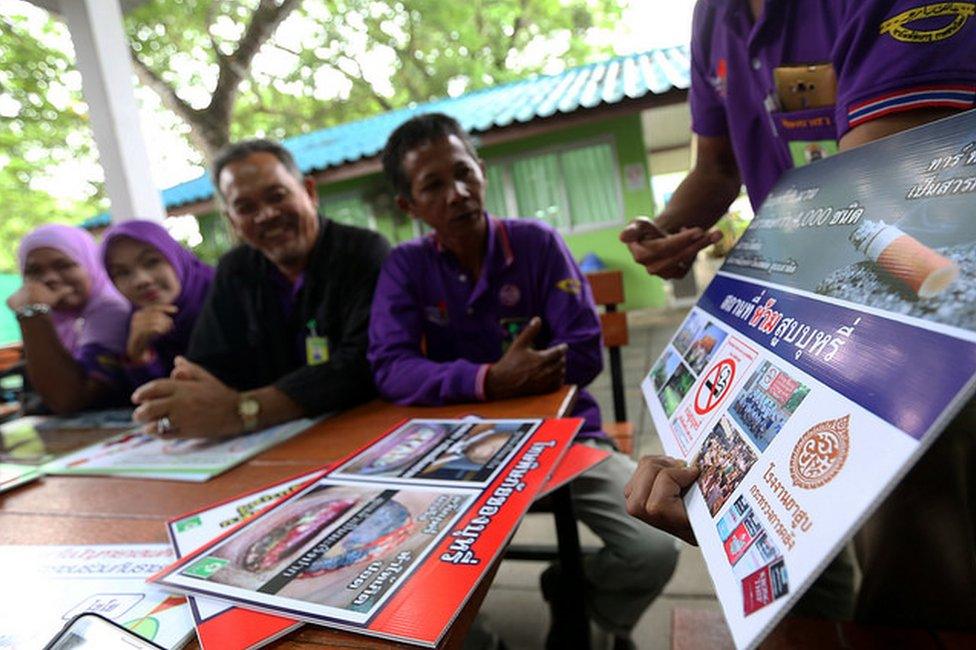
Participants in Yalannanbaru learn about the harmful effects of drugs and other vices like smoking
Ladda Ningoh from non-governmental organisation Ozone Foundation said the government is also trying to solve drug issues by creating jobs, but this has run into problems too.
"Getting them a new job in order to say that this project had this many successful participants is not a very straightforward thing to do, because sometimes you have rubber planters who have to learn how to become a barber just to meet the government's goals," she said.
She added that follow-up attempts by village chiefs also cause conflict within communities.
'We don't talk about it'
Some villages have taken matters into their own hands.
Using drugs is considered a great sin in Islam, and some places have issued rules for the village known as "hukum pakat", such as religious leaders not participating in activities with drug users.
In the village of Ban Uyib, scrap metal, electricity wires, boilers and even betel nuts, coconuts, bananas and scrap rubber are stolen on a daily basis.
This has led to the village setting up rules where both drug buyers and sellers will be fined and reported to the police. The rules, which came into effect in March, were printed on a vinyl board and placed at the mosque.
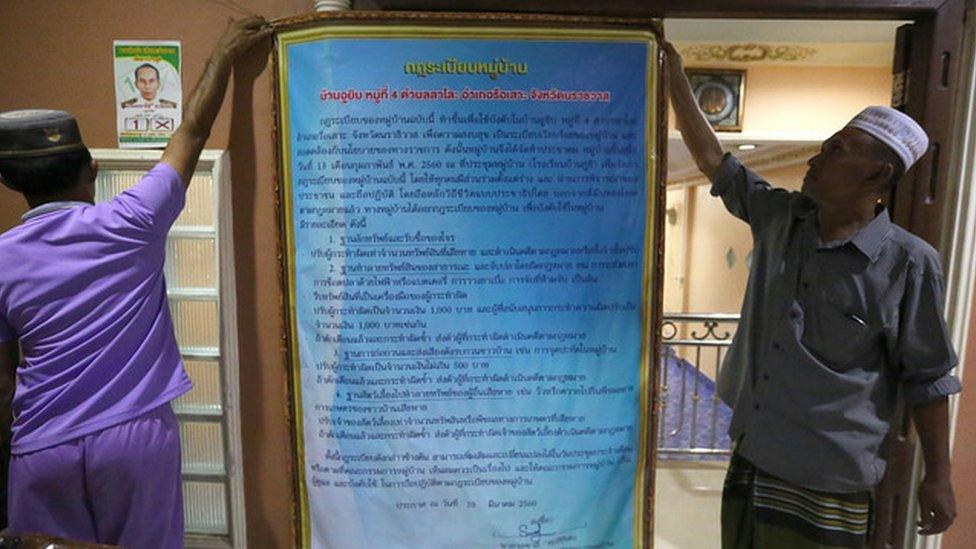
The rules state that both drug buyers and sellers will be fined and reported to the police.
Rosalee Hajiteh, the village chief, claims that thefts have since stopped.
But other places are still struggling.
"I used to tell the village chief that our people are not happy with all the thieves around here, but he didn't do anything," said Ismail in the village in Marue Botok.
"Even in our village we don't talk about it, and the government doesn't help."
The names of villagers in this story have been changed to protect their identities.
- Published11 July 2012
